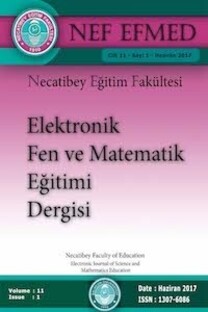Eğitim Fakültesi Öğrencilerinin Epistemolojik İnançlarının Bazı Değişkenlere Göre İncelenmesi
Epistemolojik inançlar, öğretmen adayları, öğrenme stilleri
Examination of The Epistemological Beliefs of The Teacher Candidates According to Some Variables
Epistemological beliefs, teacher candidates, learning styles,
___
- Aksan, N. & Sözer, M. A. (2007). The relationships among epistemological beliefs and problem solving skills of university students, Journal of Kırşehir Education Faculty,8(1), 31-50.
- Aşkar, P. & Akkoyunlu, B. (1993). Kolb’s learning style inventory. Education and Science, 17 (87).
- Aydın, H. & Gür, H. (2017). A New Approach to Change Epistemological Beliefs; Discussion of The Refutational Texts. Necatibey Faculty of Education Electronic Journal of Science and Mathematics Education, 11(1), 160-173.
- Aypay, A., (2011), Epistemological beliefs surveys’ adaptation of Turkey and investigation of teacher candidates’epistemological beliefs, Eskişehir Osmangazi University Social Sciences Journal, 12(1), 1-15.
- Biçer, B., Er, H. & Özel, A. (2013). The relationship between the epistemological beliefs and educational philosophies of the teacher candidates adopted, Journal of Theory and Practice in Education, 9(3), 229-242.
- Bromme, R., Pieschl, S., & Stahl, E. (2010). Epistemological beliefs are standards for adaptive learning: A functional theory about epistemological beliefs and metacognition. Metacognition and Learning, 5(1), 7-26.
- Brownlee, J., Petriwskyj, A., Thorpe, K., Stacey, P. & Gibson, M. (2011). Changing personal epistemologies in early childhood pre-service teachers using an integrated teaching program, Higher Education Research & Development, 30(4), 477-490.
- Can, A., (2014), Quantitative data analysis in the scientific research process with Spss, s. 84-85, Pegem Akademi, 2. Baskı, Ankara.
- Chai, C. S., Khine, M. S. & Teo, T. (2006). Epistemological beliefs on teaching and learning: a survey among pre-service teachers in Singapore, Educational Media International, 43(4), 285-298, 10.1080/09523980600926242.
- Deryakulu, D. & Büyüköztürk, Ş. (2002). Validity and reliability study of epistemological belief scale, Journal of Educational Researches, 2(8), 111-125.
- Deryakulu, D.(2004). The relationships between university students' learning and study strategies and their epistemological beliefs, Educational Administration: Theory and Practice, 38, 230-249.
- Deryakulu, D. & Büyüköztürk, Ş. (2005). Reexamination of factor structure of epistemological belief scale: comparison of epistemological beliefs according to gender and educational program, Journal of Educational Researches, 5(18), 57-70.
- Enman, M. & Lupart, J. (2000). Talented female students’resistance to science: an exploratory study of post-secondary achievement motivation, persistence and epistemological characteristics, High Ability Studies, 11(2), 161-178.
- Er, K.O, (2013). A study of the epistemological beliefs of teacher candidates in terms of various variables, Eurasian Journal of Educational Research, 50, 207-226
- Eroğlu, S. E. & Güven, K. (2006). Examination of epistemological beliefs of university students in terms of some variables, Selçuk University Journal of Institute of Social Sciences,16, 295-312.
- Kaleci, F. (2012). Relationship between epistemological beliefs with learning and teaching styles of mathematics teacher candidates. Unpublished Master’s Thesis. Necmettin Erbakan University Institute of Educational Sciences. Konya.
- Karasar, N., (2005), Scientific Research Method, Nobel Publications, Ankara.
- Oğuz, A. (2008). Investigation of Turkish trainee teachers' epistemological beliefs. Social Behavior and Personality: An İnternational Journal, 36(5), 709-720.
- Önen, A. S. (2011). Investigation of students’ epistemological beliefs and attitudes towards studying, Hacettepe University Journal of Education, 40, 300-309.
- Öngen, D. (2003). Relationships between epistemological beliefs and problem solving strategies: A study on education faculty students, Journal of Educational Researches, Autumn, 13, 155-163.
- Rodriguez, L. & Cano, F. (2006). The epistemological beliefs, learning approaches and study orchestrations of university students, Studies in Higher Education, 31(5), 617-636, 10.1080/03075070600923442.
- Sadıç, A., Çam, A., Topçu, M. S. (2012). Investigation of epistemological beliefs of primary school students according to gender and class level. X. National Science and Mathematics Education Congress, Niğde, Turkey, 27-30 June 2012 .
- Sapancı, A. (2012). Öğretmen adaylarının Epistemolojik inançları ile bilişüstü düzeylerinin akademik başarıyla ilişkisi, 10(1), 311-331.
- Schommer, M. (1990). Effects of beliefs about the nature of knowledge on comprehension, Journal of Educational Psychology, 82(3), 498-504.
- Schommer, M. (1993). Epistemological development and academic performance among secondary students, Journal of Educational Psychology, 85(3), 406-411.
- Schommer, M & Walker, K. (1997). Epistemological beliefs and valuing school: Considerations for college admissions and retention, Research in Higher Education, 38(2), 173-186.
- Schommer-Aikins, M., Duell, O. K. & Hutter, R. (2005). Epistemological beliefs, mathematical problem-solving beliefs and academic performance of middle school students, The Elementary School Journal, 105(3), 289-303, 10.1086/428745.
- Terzi, A. R. (2005). Research on scientific epistemological beliefs of university students, Afyon Kocatepe University Journal of Social Sciences, 7(2), 298-311.
- Tümkaya, S. (2012), The investigation of the epistemological beliefs of university students according to gender, grade, fields of study, academic success and their learning styles, Educational Sciences: Theory & Practice, 12(1), s.75-95.
- ISSN: 1307-6086
- Yayın Aralığı: 2
- Başlangıç: 2007
- Yayıncı: Balıkesir Üniv. Necatibey Eğitim Fak.
Ortaöğretimde Kimya Dersi Öğretim Programı İçin Yeşil Örnekler
TOLGA SAKA, NUR AKCANCA, Nesli KALA AYDIN, Selcan SUNGUR ALHAN
Öğretmen Adaylarının Uzamsal Yeteneklerinin Çeşitli Değişkenler Açısından İncelenmesi
SİNEM ABAY, NEŞE IŞIK TERTEMİZ, YASİN GÖKBULUT
Ortaokul Öğrencilerinin Yaratıcı Problem Çözme Becerileri
Belgi̇n BAL İNCEBACAK, ESEN ERSOY
Öğretimde Analoji Kullanımının Etkisi: Lamba Parlaklığını Nasıl Değiştirebiliriz?
Muhammet DORUK, Murat DURAN, ABDULLAH KAPLAN
Üniversite Öğrencilerinin Sosyal Ve Öğrenme Amaçlı Teknoloji Kullanım Becerileri
Eğitim Fakültesi Öğrencilerinin Epistemolojik İnançlarının Bazı Değişkenlere Göre İncelenmesi
